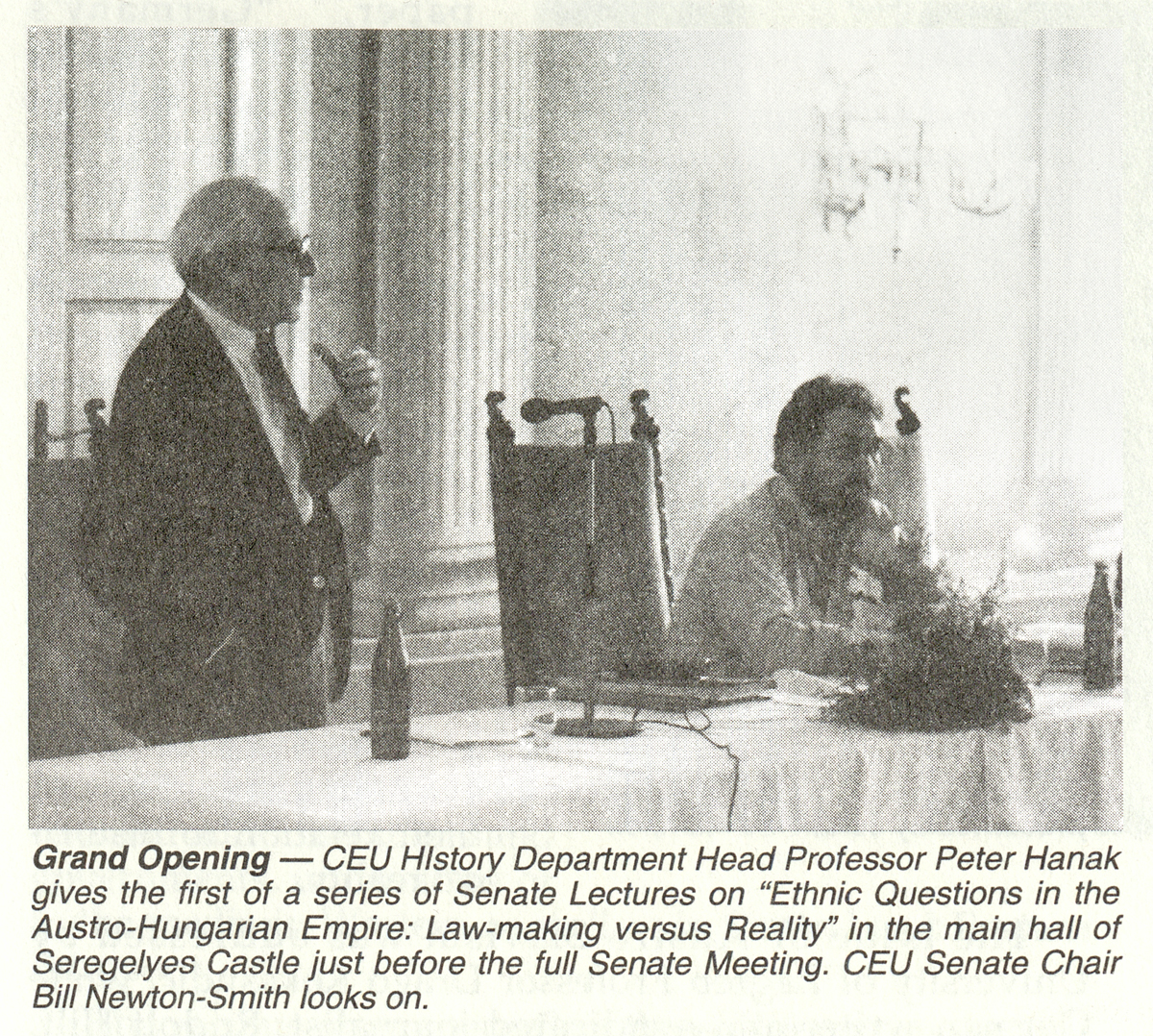The papers of Péter Hanák, historian, founder of CEU’s Department of History, were donated by his family to the Blinken OSA Archivum. His biography, titled Egy különleges közép-európai történész. Hanák Péter pályaképe (A distinct Central European historian. Péter Hanák’s career) will be published by Napvilág Publishing House during the 94th Festive Book Week; the author, Péter Csunderlik, did research at the Blinken OSA Archivum.
Péter Hanák (1921–1997) was an influential figure in historical studies in Hungary, a renowned scholar of the Austro-Hungarian Compromise and the Dual Monarchy period, and researcher of the societies (and idea) of Central Europe, who played a crucial role in channeling Hungarian history writing into the international discourse. As a lecturer, in 1989 he joined the Inter University Centre courses in Dubrovnik, and then organized the Department of History at the Central European University (CEU) in 1991, and served its first chair until 1995.
As the Blinken OSA Archivum also functions as the official archive of CEU, we were happy to welcome the historian Péter Csunderlik in our Research Room, when he undertook to write the biography of Hanák on the 100th anniversary of the latter’s birth. At the Archivum, Csunderlik primarily sought to answer how Hanák, from behind the Iron Curtain, was able to “enter Western histortiography”—his Visegrad scholarship report is available here. Now, Csunderlik concluded Hanák’s comprehensive biography, the book titled Egy különleges közép-európai történész. Hanák Péter pályaképe (A distinct Central European historian. Péter Hanák’s career), published by Napvilág Publishing House, will be first available at the 94th Festive Book Week, Budapest (June 8–11, 2023).
Recently donated to the Blinken OSA Archivum, the Péter Hanák papers consists mainly of his own manuscripts and research materials, as well as personal papers and correspondence. The collection includes Hanák’s publications and their drafts, such as the seventh volume of the book series Magyarország története (History of Hungary), covering the period 1890–1918, published in 1978; his 1985 monograph Jászi Oszkár dunai patriotizmusáról (On Oszkár Jászi’s Danube patriotism); his research on cultural history conducted as a fellow at Princeton University and the Wilson Center, published in the US as The Garden and the Workshop in 1998; or Modernizáció és antikapitalizmus Magyarországon (Modernization and anti-Capitalism in Hungary), his inaugural lecture as Full Member of the Hungarian Academy of Sciences, delivered in 1996. The collection also includes his unfinished writings, for instance the posthumously published monograph on the Austro–Hungarian Compromise or his biography of István Tisza. Besides publications, he examined (even promoted) the concept of Central Europeanism in university lectures and courses, debating it with his students, and reached out to audiences outside academia as editor of popular science programs like A Dunánál. Történelmi figyelő (By the Danube. Historical monitor), a show that ran on state radio for 10 years; these activities also have traces in the Hanák papers. The never-published interview conducted by Péter Pál Tóth is a unique source document, while Hanák’s own autobiographical records, diaries, and extensive correspondence are essential to the reconstruction of his position in the international academic arena.
 Péter Hanák with Bill Newton-Smith (who passed away recently) in the fall 1993/94 issue of the CEU Gazette.
Péter Hanák with Bill Newton-Smith (who passed away recently) in the fall 1993/94 issue of the CEU Gazette.
(HU OSA 211-0-1 Records of the Office of Bill Newton-Smith, Central European University)
The Blinken OSA Archivum already held several documents related to Péter Hanák in its various collections (for a full list, see Csunderlik’s scholarship report). The Biographical Files within the Records of the RFE/RL Research Institute reflect his figure as a historian, and, naturally, the Administrative Records of the Department of History, within the Records of CEU, present him as lecturer and department chair. The Black Box Foundation recorded in 1995 two of his lectures at CEU, and interviewed him about the history of CEU and specifically of the Department of History. In the latter video, he notes: “Many injustices have been committed, and I am aware of them. But we can eliminate injustice not by counter-injustices, but through a very slow, patient, mutual understanding. That is what this university and especially the Department of History, which I have been leading for five years now, pursues. And I believe this to be at least as patriotic, or rather more patriotic, than tossing grievances at each other, and inciting national misunderstanding, hatred, and vengeance.”
The fonds will be available for research once processed.

